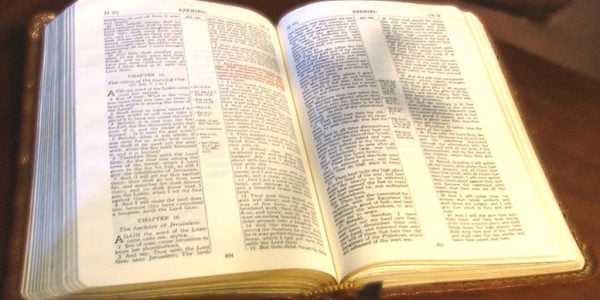
One way to talk about the tragic division in contemporary American Christianity is to say that it has pitted the ideas of love of God and love of neighbor against each other. Team Family Values tends to define sin and morality in the vertical terms of our relationship with God while Team Social Justice tends to define sin and morality in the horizontal terms of our relationships with other humans. When I read the Bible, I come away with the understanding that we can’t be right with God without being right with our neighbor and vice-versa. When we make objects god other than God (idolatry), we are disordered in such a way that we mistreat others (injustice).
In the United Methodist Church right now, one faction talks a lot about seeking holiness while the other faction is talking about resisting harm. And I would say that unless you are seeking holiness, you cannot resist harm, and unless you are resisting harm, the holiness you are seeking is a false holiness. That is to say that I cause harm to others to the degree that I lack holiness. And whatever holiness I gain that doesn’t reduce my harm to others isn’t actually holiness (see also 1 Corinthians 13:1-3).
My theological understanding continues to be definitely shaped by an incredibly radical interpretation of Hebrew scripture that Jesus makes in an early conversation with the religious authorities. When they attack him for partying with a bunch of sinful people, he says, “Go and learn what this means, ‘I desire mercy, not sacrifice.’ For I have come to call not the righteous but sinners” (Matthew 9:13).
In this verse, Jesus is quoting Hosea 6:6. What’s significant is that Jesus changes the meaning of the passage through how he applies it. What God says in Hosea 6:6 is “I desire steadfast love and not sacrifice, the knowledge of God rather than burnt offerings.” So if an evangelical youth group were studying this together, then a very reasonable, straightforward interpretation could be “God doesn’t want your good deeds; he wants you to read your Bible every day and really get to know him.”
Hosea 6:6 uses the Hebrew word chesed that can be translated as the Greek eleos or “mercy,” but it’s usually translated as “steadfast love,” because in the passage, God is asking for the Israelites to give him their steadfast love instead of just making perfunctory, dutiful sacrifices. It wouldn’t make any sense for him to be asking his people for mercy. He’s God; they’re the ones who need his mercy.
There is nothing in the context of the Hosea passage that suggests that God wants his people to be merciful to each other; he wants them to be loyal to him. So when Jesus interprets chesed as mercy for each other rather than loyalty to God, what he’s saying in effect is that the way to be loyal to God is to be merciful to each other. In other words, Jesus is saying that what God desires more than meticulous rule-following that shows respect for his authority is having mercy for people who suck at following rules. There is no exegetical basis for Jesus to make Hosea 6:6 logically related to God calling sinners instead of righteous people. It’s a non-sequitur, unless we understand that Jesus is saying God prefers flawed, merciful people to meticulously loyal, self-righteous people.
It seems like those who talk about holiness all the time often understand holiness in terms of sacrifice rather than mercy. Holiness means proving to God that I really put him before everything else, that I’m not in any way soft in my discipline and religious zeal. There is nothing more exhausting than living a life of trying to prove your zeal to God or other people. It makes people toxic and self-righteous. This self-justifying zeal is what caused the religious authorities to loathe and ultimately crucify Jesus. It’s also what Jesus’ sacrifice on the cross is supposed to liberate Christians from. If we are justified by his blood, then we are not justified by our correct beliefs or behavior. Jesus’ justification saves us from trying to justify ourselves.
It’s only when we understand that God wants mercy rather than sacrifice that we can pursue holiness in the right way. The perfection God wants from us is to be perfectly loving, to be so utterly trusting in his mercy that we channel and embody his mercy towards other people. It’s not about striving to speak and act correctly; it’s about surrendering to God’s mercy and letting it take us over.
When holiness has the goal of mercy, that dissolves the impetus for trying to prove that you’re adequately zealous for God’s authority by taking a “tough stance” on gay marriage or whatever other perceived “secular humanist” cause you think you’re supposed to define yourself against. Mercy is the thing about Christianity that goes against the grain of the world’s ways, not patriarchal gender norms or austerity for its own sake. It’s not that mercy needs to be “balanced” with holiness (not every truth has to consist in two binary terms held “in tension”); mercy is the fulfillment of holiness. Every refinement that God makes to my character through the means of grace he gives me has the purpose of polishing me into the best possible vessel of his mercy. My sin is a problem because it makes me less merciful, and that’s the part that makes God mad. When the holiness zealots become zealous for mercy, then Christianity’s true beauty will shine forth.












